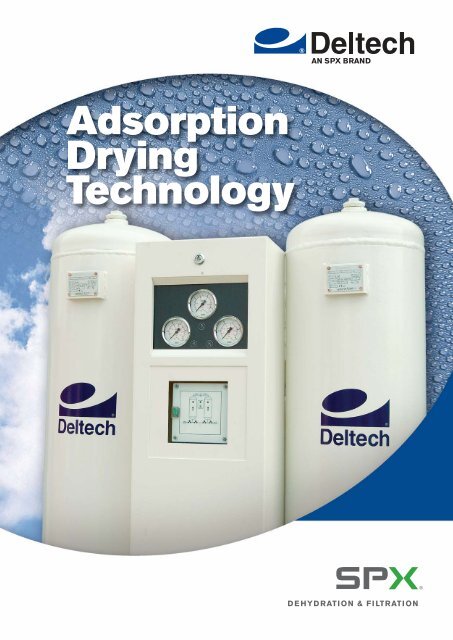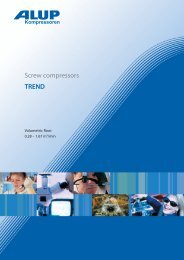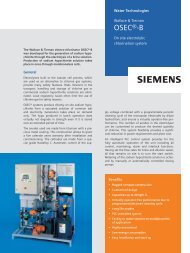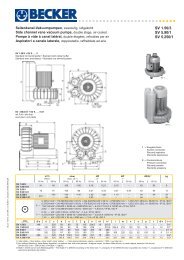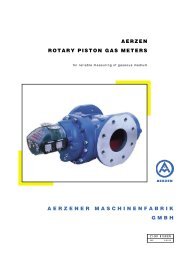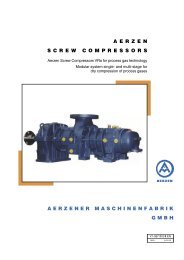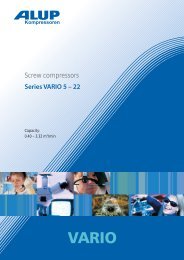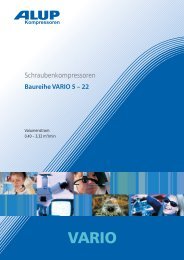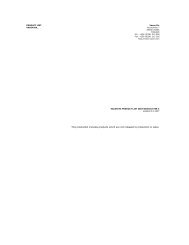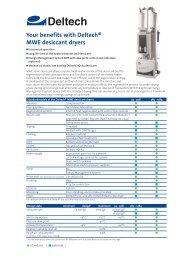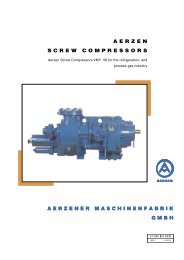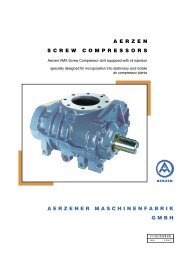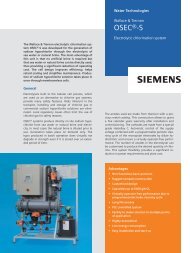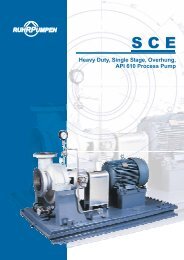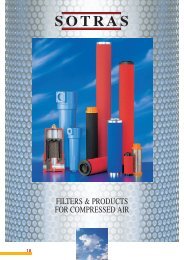Adsorption Drying Technology
Adsorption Drying Technology
Adsorption Drying Technology
Create successful ePaper yourself
Turn your PDF publications into a flip-book with our unique Google optimized e-Paper software.
<strong>Adsorption</strong><br />
<strong>Drying</strong><br />
<strong>Technology</strong>
<strong>Adsorption</strong> Dryers<br />
Our experience is the best guarantee<br />
for a perfect result!<br />
SPX Dehydration & Filtration is one of<br />
the world’s largest manufacturers of filters<br />
and dryers for compressed air and<br />
other gases. More than 65 years of<br />
experience form the basis of a unique<br />
level of know-how in the area of industrial<br />
application of compressed air<br />
treatment. Our commitment to continuously<br />
improve our products and technologies<br />
has resulted in an extensive<br />
line of adsorption dryers, offering the<br />
highest level of quality, reliability and<br />
economical use. Deltech products are<br />
designed for long-life duty in industrial<br />
environments.<br />
Compressed air is a widely used<br />
source of energy and power. When<br />
used in a production process, the<br />
compressed air must be clean and dry.<br />
Filters trap dust, oil and other contaminations.<br />
Dryers remove water vapour<br />
out of the compressed air. Moisture,<br />
dirt and dust in the airflow can cause<br />
costly problems, such as excessive<br />
wear of pneumatic equipment, blocked<br />
precision apertures, inadequate<br />
measure and control functions, or total<br />
loss of machinery and processes.<br />
Moisture in process applications can<br />
have a detrimental impact on finished<br />
products or initiate undesirable chemical<br />
reactions. At sub-zero temperatures<br />
the moisture in compressed air<br />
lines will freeze, leading to pipe cracking<br />
and in some cases to complete<br />
plant shut-down.<br />
Deltech adsorption dryers protect compressed<br />
air installations and processes<br />
to a pressure dewpoint as low as<br />
-70°C. Depending on the operating<br />
conditions, available regeneration<br />
energy and on the required pressure<br />
dewpoint, Deltech can offer a broad<br />
variety of adsorption dryers.<br />
After being adsorbed in a bed of desiccant<br />
material, the water molecules<br />
need to be removed out of the compressed<br />
air dryer by means of regeneration.<br />
The method of regeneration<br />
must be selected in accordance with<br />
the available means of energy and the<br />
operating conditions. Deltech offers<br />
various regeneration principles, for<br />
most economical use of energy.<br />
Eurodry ED series
for Compressed Air<br />
Heatless-regenerated<br />
adsorption dryers<br />
Heatless regenerated adsorption dryers use a simple regeneration principle, using a<br />
small portion* of the dried compressed air, expanded to atmospheric pressure. This<br />
extremely dry air flows in counter-flow direction through the saturated desiccant and<br />
removes the moisture. The adsorption/regeneration cycle is electronically controlled<br />
and varies from 4 to 10 minutes, depending on the size of the dryer.<br />
Heatless-regenerated adsorption dryers require a minimum of service, are very flexible<br />
in their application and can be installed easily. The relatively short cycle times<br />
allow short on/off switching sequences. In case the dewpoint performance is not too<br />
critical, heatless dryers can be controlled by the running contact of the compressor.<br />
The Eurodry ED and EDC series are heatless adsorption dryers, providing a pressure<br />
dewpoint from -20°C to -70°C. (ISO 8573, class 1-3)<br />
EDC dryers are available in a capacity range from 6 to 240 m³/h, offering many<br />
advantages. This very compact design requires a minimum of floor space. All service<br />
parts are easy to access and the inlet and outlet connections can be chosen on<br />
either side of the dryer, depending on the positioning of the compressor.<br />
Eurodry Compact EDC series<br />
The drying cycle is controlled electronically and features a memory function, which<br />
ensures that the regeneration cycle is completed after re-starting the dryer.<br />
ED series heatless adsorption dryers (capacity range from 160 to 5.950 m³/h) offer a highly reliable performance, combined with<br />
a maximum of economic use. Specially selected inlet valves are pneumatically-controlled and require a minimum of maintenance.<br />
Using a manual setting device, the user can select the required dewpoint and adapt the dryer to varying loads. Inlet and outlet filters<br />
can be fitted to the dryer, forming a compact and complete quality air treatment package. Optionally, a third pressure vessel<br />
can be installed, containing activated carbon. This adsorber will provide technically oil-free air for use in special applications, such<br />
as electronic industry, medical applications and drug and food handling processes.<br />
Optional ED series dryers can be supplied with a dewpoint-controlled cycling device. A highly sensitive dewpoint meter is installed<br />
at the outlet of the dryer and measures the saturation degree of the drying adsorber. The regeneration will not start before the<br />
maximum drying capacity has been reached. Under “low load” operating conditions this device will economize the regeneration<br />
process and save an important quantity of regeneration air.<br />
* Deltech dryers use about 15% of the dry air capacity for regeneration under standard operating conditions according to ISO 7183, for a pressure dewpoint of -40°C.<br />
Energy Management System (EMS)<br />
for heatless adsorption dryers<br />
<strong>Adsorption</strong> dryers have to cope with different operating conditions<br />
and are therefore selected for the most adverse conditions.<br />
According to ISO 7183, the standard operating conditions are:<br />
working temperature 35°C and operating pressure 7 bar gauge.<br />
A higher temperature or a lower operating pressure requires a<br />
higher adsorption and regeneration capacity. On the other side,<br />
during phases of reduced operation (at night, during weekends or<br />
under winter conditions), where the maximum adsorption performance<br />
is not required, the regeneration performance should<br />
continually adapt to the changing conditions.<br />
Energy Management and more ...<br />
The standard cycle-control programme controls the drying and<br />
regeneration phases on a fixed-time basis. The changeover<br />
takes place automatically and timer controlled, independently of<br />
the saturation level of the desiccant. Since the dryer is selected<br />
for the worst operating conditions, the regeneration energy used<br />
will be too much most of the time. In order to avoid this, the use<br />
of a dewpoint-monitoring, load-dependent control system is<br />
recommended.<br />
For this purpose, a high-sensitive humidity sensor is placed at the<br />
outlet of the dryer so that the saturation level of the desiccant<br />
can be monitored. The operator can freely select a dewpoint<br />
between -10°C and -40°C. Once this level is reached, the drying<br />
phase is finished and the regeneration phase started. The result<br />
is an extended drying phase and a delayed regeneration phase.<br />
When the dryer is not working under full load, up to 90% of the<br />
regeneration energy can be saved.<br />
Apart from this, the dewpoint controller provides a display for<br />
operating parameters, energy savings and the necessary service<br />
intervals.
Heat-regenerated adsorption dryers<br />
Over 65 years of experience in the field of<br />
drying and filtration of compressed air have<br />
resulted in a most complete range of heatregenerated<br />
adsorption dryers. The utilisation<br />
of compressed air for the regeneration<br />
of the saturated desiccant is a very expensive<br />
solution. Filtered and dried compressed<br />
air is a very expensive source of<br />
energy, which should possibly not be used<br />
for regeneration. Regeneration takes place<br />
easier and faster if the desiccant is<br />
warmed up. The regeneration air, warmed<br />
up to 180°C, desorbs the humidity out of<br />
the desiccant and transports it out of the<br />
dryer. The energy required is then less<br />
than half compared to the heatless regeneration.<br />
The principle of heat regeneration can be<br />
divided in three groups:<br />
Internally-heated adsorption dryers,<br />
where heating elements are placed in the<br />
desiccant to warm it up.<br />
Externally-heated adsorption dryers,<br />
where air from the environment is aspirated<br />
and electrically warmed-up and<br />
blown through the saturated desiccant.<br />
Heat-of-compression systems, where the<br />
high temperature at the outlet of the<br />
compressor is used for regeneration.<br />
Internally-heated<br />
adsorption dryers<br />
Deltech Serie MWE<br />
These dryers have electrical heating elements<br />
placed into the drying bed which<br />
warm-up the desiccant directly. A minimal<br />
quantity of dried compressed air (about<br />
2.5%) is used to transport the moisture out<br />
of the adsorber and cool the desiccant<br />
down at the end of the regeneration phase.<br />
During changeover, the compressed air<br />
flows through both vessels simultaneously<br />
for about 20 minutes, whereby possible<br />
temperature and dewpoint fluctuations are<br />
balanced.<br />
The utilisation of the optional Energy Management<br />
System results here in significant<br />
energy savings, especially in the case of<br />
changing operating conditions. The MWE<br />
series covers a range of performance from<br />
245 to 4280 m³/h and provide a pressure<br />
dewpoint of down to -40°C (Specification<br />
according to ISO 7183)<br />
MWE Series: Internally-heated <strong>Adsorption</strong> Dryer
Externally-heated adsorption dryers<br />
Delair Serie DB<br />
This heat-regenerated adsorption dryer is the most commonly used in medium-sized to<br />
big-sized compressed air installations (from 350 to 13.000 m³/h). As opposed to the<br />
internally-heated dryers, the heaters used for regeneration are easy to control, simple to<br />
service and they can optionally be combined with steam heating.<br />
In these dryers, the flow during the drying and during the regeneration are both from top<br />
to bottom. This principle offers the following advantages:<br />
An optimal utilisation of the regeneration energy and heat of adsorption<br />
No dewpoints peaks during changeover<br />
Protection against appearance of liquid water<br />
No loss of compressed air for the cooling process<br />
Protection of the desiccant at starting of the compressor and from pressure and flow<br />
fluctuations.<br />
Delair DB dryers do not make use of any compressed air and have a maximal pressure<br />
drop of 0.1 bar. This drying principle also offers the possibility of an Energy Management<br />
System with ample technical and economical advantages. A special option is the<br />
“closed-loop” cooling, which makes it possible to use the dryer with high ambient temperature<br />
or when a pressure dewpoint of -70°C is required. Also under such conditions,<br />
no compressed air is used for regeneration or cooling.<br />
The DB series dryers are simple to operate and are equipped with a display showing<br />
current information and historical operating data. Extra communication modules for connection<br />
with higher-level process control systems are also available.<br />
Heat of compression<br />
Delair XD dryer<br />
The motivation behind the development<br />
of the XD adsorption dryer series was<br />
the desire to make rational use of available<br />
energies. Installations of this series<br />
utilise the heat of compression of the<br />
compressed air for the regeneration of<br />
the saturated desiccant. The compressed<br />
air coming from an oil-free<br />
compressor with a temperature of 110<br />
to 230°C is used for the regeneration<br />
process, before being cooled down to<br />
35°C in the compressor aftercooler.<br />
After being cooled down, the compressed<br />
air is dried to a dewpoint of<br />
0 to -40°C, depending on the available<br />
regeneration temperature. By means of<br />
this procedure no extra energy is needed<br />
and there is no loss of compressed<br />
air. <strong>Drying</strong>, regeneration and cooling<br />
take place under pressure. Because of<br />
this, the mechanical strain on the adsorbent<br />
and the valves is minimal and the<br />
service intervals are extended.
Deltech Hybridryer, the synergy of combination<br />
Certain production processes such as instrument air, air for pneumatic control systems and process engineering solutions, feed air for<br />
the transport of powdery materials in the chemical, pharmaceutical and food processing industries, etc., require dependably treated,<br />
high-quality compressed air - technically oil-free and very dry - with pressure dew points of below 0°C down to -40°C.<br />
If the compressed air is channelled through extensive pipe networks or in areas exposed to ambient weather conditions, disturbances<br />
due to frozen condensate are - especially in winter time - the order of the day.<br />
Here, a flexible dryer type is necessary, which selects the dewpoint depending on the ambient conditions.<br />
The Hybridryer uses the most cost-effective refrigerant dryer system for the air treatment up to +3°C, which removes the main water<br />
load from the compressed air (85%!).<br />
compressed air inlet<br />
compressed air outlet<br />
regeneration<br />
air inlet<br />
fan heater dustfilter<br />
air/air heat<br />
exchanger<br />
dessicant adsobers<br />
regeneration<br />
air outlet<br />
bypass<br />
water separator<br />
and oil finefilter<br />
air/refdrigerant<br />
heat exchanger<br />
condensate drain<br />
The integration of a specially-sized adsorption dryer in<br />
the cold air flow brings about the same compressed air<br />
quality as an adsorption dryer designed for standard<br />
conditions. However, the Hybridryer uses only about<br />
50% of the normally required energy!<br />
This extremely cost-effective technology becomes even<br />
more interesting when the adsorption dryer can be<br />
completely switched off with the automatic by-pass,<br />
which is controlled by the ambient temperature. Under<br />
summer conditions the compressed air is dried by the<br />
refrigeration dryer only, providing a reliable and steady<br />
pressure dewpoint of +3°C. Dropping ambient<br />
temperature will automatically reactivate the desiccant<br />
dryer and the Hybrid combination will dry the<br />
compressed air down to -40°C pressure dew point.<br />
The slightly higher capital investment will be largely<br />
compensated by the considerably lower operation cost.<br />
This makes the Hybridryer a state-of-the-art solution in<br />
the field of compressed air treatment starting from<br />
1000 m³/h.<br />
For further information about this drying system, please<br />
see the detailed brochure
adsorption = g H2O / 100g adsorbent<br />
40<br />
30<br />
20<br />
10<br />
molecular sieve<br />
silicia gel<br />
relative huminity %<br />
ideal condition for the adsorbent activated alumina<br />
activated<br />
alumina<br />
0 20 40 60 50 100<br />
energy consumption W/m 3<br />
20<br />
15<br />
10<br />
5<br />
dew<br />
point<br />
class<br />
1<br />
(-70 ∞C)<br />
heatless regenerative desiccant dryer<br />
= heated regenerative desiccant dryer<br />
2<br />
(-40 ∞C)<br />
3<br />
(-20 ∞C)<br />
Hybridryer<br />
membrane dryer*<br />
4<br />
(+3 ∞C)<br />
refrigeration dryer<br />
dew point classes and their energy requirements<br />
5<br />
(+7 ∞C)<br />
HybriDryer<br />
regenerative desiccant dryer refrigeration dryer<br />
membrane dryer*<br />
* only for small volume flows<br />
6<br />
(+10 ∞C)<br />
200 t<br />
CO2 emissions in 12 months<br />
100 t<br />
desiccant dryer*<br />
dew point -40∞C<br />
C02 reduction<br />
49%<br />
HybriDryer<br />
dew point -40∞C<br />
– flow 5000 m 3 /h in 12 months<br />
*market<br />
standard<br />
investment<br />
HybriDryer<br />
1 2 3 4 5<br />
years<br />
desiccant dryer*<br />
savings<br />
*market standard<br />
CO2 reductions with the HybriDryer<br />
cost savings with the HybriDryer<br />
Deltech filters<br />
complement<br />
the air treatment.<br />
All adsorption dryers use a highly efficient<br />
adsorbent Delsorb HQ, which<br />
has a lifetime of about 5 years under<br />
standard operating conditions. This<br />
durability can be considerably shortened<br />
due to oil, liquid water and other<br />
impurities. For this reason, it is also<br />
necessary to install a dirt filter and an<br />
oil fine filter at the inlet of the dryer.<br />
Since the desiccant produces some<br />
dust as a result of the mechanical and<br />
thermal strain, it is also necessary to<br />
protect the downstream part of the<br />
system with a dust filter.<br />
Deltech offers a complete filter programme,<br />
precisely conceived for the<br />
adsorber series.<br />
Hybrid-Serie DHD
ad_en_11_08<br />
SPX Dehydration & Filtration GmbH<br />
Konrad-Zuse-Straße 25<br />
D-47445 Moers · Germany<br />
Telefon: + 49 (0) 28 41 / 8 19-0<br />
Fax: + 49 (0) 28 41 / 8 19 83<br />
email: deltech@deltech-spx.eu<br />
www.deltech-spx.eu


